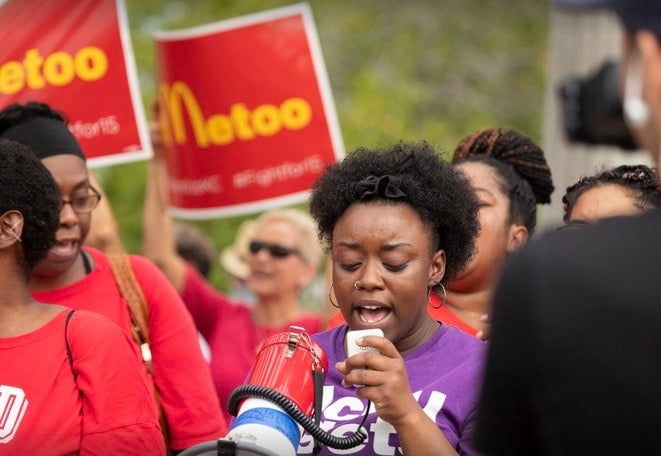Back in the fall of 2017, each day I spent on the job at McDonald’s, I’d try to wrap up my shift early to avoid him. I knew if he saw me, he’d hit on me.
“You have a nice body,” he told me once. “You should leave your boyfriend,” he said another time. He also hit on me with lines like “You are a chocolate drop” and “You are chocolate.”
He was the night shift manager at my McDonald’s store. His comments made me beyond uncomfortable. But because he was my superior, I knew I had to be polite — find a way to reject his advances without jeopardizing my job.
I had not received training from McDonald’s on what sexual harassment was, let alone how to report it. Too afraid to report a manager, I rearranged my schedule to avoid him. I feared that if I reported him, things would only get worse for me. The harassment was bad enough. I did not want to lose my job too. To McDonald’s, I was just a number. I felt alone. I couldn’t imagine telling my story loud enough that the general manager at my store would take notice, let alone this giant company.
Fast forward one year: someone unexpected handed me a powerful megaphone. Gretchen Carlson, the former Fox News anchor who took down her own harasser, Roger Ailes, asked me to tell my story as part of her new project on women experiencing sexual harassment in the workplace.
Although our circumstances are very different, we’ve faced similar challenges: a workplace poisoned by sexual harassment and a powerful corporation committed to sweeping it under the rug. Gretchen didn’t let that intimidate her. She went up against her employer, and she won.
If Gretchen Carlson could succeed in holding Fox News accountable on sexual harassment, there’s no reason workers like myself can’t do the same with McDonald’s.
For one thing, the numbers are on our side. I’m not the only one making these demands; the problem is rampant. A 2016 Hart Research survey found 42 percent of women in the fast-food industry have experienced unwanted sexual behavior at work, but feel forced to accept it because they can’t afford to lose their jobs.
I’m also one of the scores McDonald’s workers who have filed complaints with the Equal Employment Opportunity Commission (EEOC) over sexual harassment. And we know there are countless others who have experienced sexual harassment at the Golden Arches.
Last fall, hundreds of us in 10 cities walked off the job in the first sexual harassment strike in more than 100 years. The response we got was astounding. It’s clear the #MeToo movement touches everyone, from Hollywood to hot griddles.
Public pressure over sexual harassment has reached a critical point: abusive behavior that was once brushed aside is now leading to major executives getting fired, from Roger Ailes to Harvey Weinstein to Les Moonves.
But what about when the harassers aren’t at the top of powerful corporations — what about when they’re McDonald’s managers? What happens when the victims of harassment aren’t famous actresses, but women of color working fast-food jobs?
The consequences should be the same. Sexual harassment is sexual harassment. But so far, McDonald’s — from shift managers to the C-suite — has failed to make meaningful changes to prevent other workers from experiencing the type of harassment I did.
We know McDonald’s could make real change if they wanted to do so. Everything at McDonald’s is systematic: the training, the food preparation, the cleaning, and the customer service.
If McDonald’s would just make a commitment, it could be a leader in ramping down sexual harassment. As the world’s second-largest private employer, any action McDonald’s takes against sexual harassment becomes a model for employers across the economy.
Instead, McDonald’s has failed to acknowledge this problem. But we won’t back down. To the contrary, we’ll join together and continue speaking out until powerful companies, from Fox News to McDonald’s, take responsibility for curbing sexual harassment.

